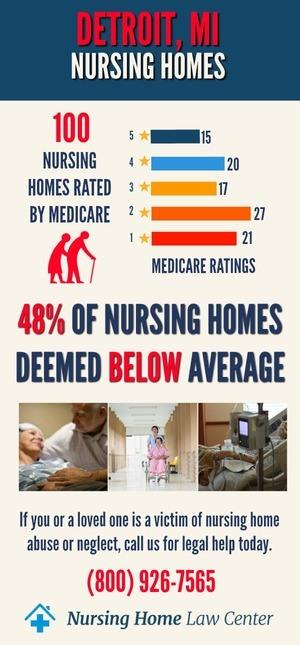The Nursing Home Law Center is committed to providing the legal resources necessary to hold negligent facilities accountable.
Detroit Nursing Home Abuse Lawyer

Licensed in Michigan
Nursing home abuse is a devastating violation of trust that leaves elderly individuals and their families facing physical, emotional, and financial hardship. Suppose your family member has suffered from abuse or neglect in a Detroit, Michigan, nursing home or assisted living facility.
In that case, it’s critical to seek help from an experienced Detroit nursing home abuse lawyer. These cases require legal expertise to protect your loved one’s rights and pursue compensation for the harm they have endured.
Why Hire Nursing Home Law Center
At Nursing Home Law Center, we are dedicated to pursuing justice and compensation for victims of elder abuse. Our knowledgeable legal team has a strong history of managing nursing home abuse cases with care and achieving favorable settlements and verdicts for our clients.
We thoroughly investigate each case, addressing every aspect of the abuse, including medical costs, emotional distress, and other losses. With our extensive experience in handling nursing home abuse claims, we manage the legal challenges efficiently and fight relentlessly to safeguard your rights.
Types of Cases Handled by Our Detroit Nursing Home Abuse Lawyers
Nursing home abuse is any form of mistreatment or neglect that leads to harm or suffering for a nursing home resident. This abuse can take many forms, and our Detroit nursing home abuse attorneys handle a wide range of cases, including:
Physical Abuse
Physical abuse involves intentional actions that cause bodily harm to residents, such as hitting, kicking, or inappropriate use of restraints. Signs of physical violence can include unexplained bruises, broken bones, or other severe injuries. A resident may become fearful of certain staff members.
Mental and Emotional Abuse
Emotional abuse can be just as harmful as physical abuse. This type of elder abuse often involves threats, intimidation, isolation, or verbal insults, leaving the victim feeling helpless or afraid. Personality changes are common among victims of emotional abuse.
Sexual Abuse
Sadly, sexual abuse can occur in nursing homes, where vulnerable residents are taken advantage of by staff or other residents. Any form of unwanted sexual contact or behavior is a severe violation of trust that demands immediate legal action. Residents may have injuries in private areas or unexplained STIs.
Medical Malpractice
Medical malpractice occurs when a nursing home fails to provide proper medical care, leading to harm. This includes issues such as untreated pressure sores, administering the wrong medication, or failure to address infections or other medical conditions.
Negligence
Nursing home negligence can include poor hygiene, malnutrition, dehydration, or allowing residents to wander (elopement). These conditions often result in severe physical and emotional harm.
Financial Abuse
Financial abuse occurs when caregivers or staff exploit residents financially by stealing money, forging signatures, or coercing residents into making financial decisions. Staff or other residents may steal personal belongings.
Wrongful Death
In the most tragic cases, nursing home neglect or abuse can lead to a resident’s death. A wrongful death lawsuit allows family members to seek justice for the loss of their loved one due to negligence or abuse.
Understanding Your Legal Rights
Federal and state laws protect the rights of residents in Michigan nursing homes.
The Nursing Home Reform Act of 1987 ensures that all nursing homes receiving Medicaid or Medicare funding must meet specific standards of care. This law grants nursing home residents the right to live free from abuse, neglect, and exploitation.
Michigan law further protects residents by requiring nursing homes and assisted living facilities to provide a safe and healthy environment.
Michigan nursing home residents have the legal right to file a nursing home lawsuit. If the elderly person cannot act, family members or legal guardians can pursue legal recourse. In wrongful death cases, the estate or family can seek compensation through a lawsuit.
Liability in Nursing Home Neglect and Abuse Cases
Multiple parties may be held liable for abuse in a nursing home or assisted living facility. Liability can extend to:
- Nursing home staff: Caregivers, nurses, or other employees responsible for the resident’s care can be held accountable for acts of abuse or neglect.
- The nursing home: The facility may be held responsible if poor training, understaffing, or failure to follow safety regulations led to the abuse.
- Third-party contractors: In some cases, contractors, such as medical staff or maintenance workers, may be held liable if their negligence or misconduct contributed to the harm.
How Our Detroit Nursing Home Abuse Attorneys Can Help
Our Detroit nursing home abuse lawyers have extensive experience handling nursing home abuse cases and are committed to fighting for justice on behalf of victims. When you work with our law firm, you receive dedicated legal representation to seek justice and compensation for the injuries suffered.
We offer a range of services, including:
- Free Consultation: We provide a free case evaluation to determine the strength of your case and discuss your legal options.
- Case Investigation: Our legal team will thoroughly investigate your nursing home abuse case, reviewing medical records, speaking to witnesses, and gathering evidence.
- Filing the Claim: We handle the entire legal process of filing the claim, ensuring that all deadlines are met and the claim is prepared correctly.
- Settlement Negotiation: Our personal injury lawyers will negotiate with the insurance company or opposing counsel to secure a fair settlement.
- Trial Representation: If a settlement cannot be reached, we are prepared to take the case to court and fight for your loved one’s rights.
Common Signs of Elder Abuse Among Nursing Home Residents
In Detroit, Michigan, there are 116 Medicare-certified nursing homes. Of these, 58 facilities (50%) have an overall rating below or much below average. Specifically, 62 nursing homes (53%) fall short in health inspections, and 62 facilities (53%) have inadequate staffing levels. 13 facilities (11%) rated poorly in quality measures. [1]
The worst-rated nursing homes in Detroit include:
| Evergreen Health and Rehabilitation Center | Greenfield Rehab and Nursing Center |
| Imperial, A Villa Center | Lakeside Manor Nursing and Rehabilitation Center |
| Majestic Care of Livonia | Medilodge of Shoreline |
| Medilodge of Sterling Heights | Mission Point Nsg & Phy Rehab Ctr of Beverly Hills |
| Mission Point Nsg & Phy Rehab Ctr of Clawson | Mission Point Nsg & Phy Rehab Ctr of Clinton Twp |
| Mission Point Nsg & Phy Rehab Ctr of Elmwood | Northville Manor |
| Oakridge Manor Nursing & Rehab Center LLC | Regency, A Villa Center |
| Riverview Health and Rehab Center North | Skld Bloomfield Hills |
| Skld Plymouth | Skld West Bloomfield |
| The Manor of Novi | The Orchards at Harper Woods |
| The Orchards at Warren | The Orchards at Wayne |
| The Springs at Rochester Hills Rehab & Nursing Ctr | The Villa at City Center |
| Westwood Nursing Center |
Detecting nursing home abuse early is critical to stopping it and protecting your loved one. Common signs include:
- Unexplained physical harm such as bruises, broken bones, or pressure sores
- Sudden weight loss or dehydration
- Fear or anxiety around specific caregivers
- Unsanitary living conditions
- Unexplained changes in financial accounts or missing personal items
- Withdrawal from social interactions or sudden changes in behavior
- Sudden development of mental illnesses, such as PTSD
- Appear unkempt, such as dirty nails, soiled clothing, or unbrushed hair
- Unexplained changes in medical conditions may be due to medication errors or additional stress
- Suddenly refusing to eat
What to Do If You Suspect Nursing Home Abuse
If you believe your loved one is a victim of nursing home abuse, take immediate action:
- Call 911 if there is immediate danger or physical harm.
- Report to the nursing home administrator or management and document the incident.
- File a complaint with your local Ombudsman’s office, which advocates for the rights of nursing home residents.
- Contact a Detroit nursing home abuse lawyer to discuss your legal options and begin the process of holding the responsible parties accountable.
Damages You Can Recover Through a Nursing Home Abuse Claim
Victims of nursing home abuse may be entitled to various forms of compensation, including:
- Economic damages: Medical bills, relocation costs, and other financial losses related to the abuse.
- Non-economic damages: Compensation for pain and suffering, emotional trauma, and reduced quality of life.
- Punitive damages: In cases of extreme negligence or intentional harm, punitive damages may be awarded to punish the wrongdoer.
The Cost of Hiring a Detroit Nursing Home Abuse Lawyer
At our law firm, we work on a contingency fee basis, meaning you pay no upfront legal fees. We only get paid if we successfully recover compensation for you and your family. This allows you to seek justice without worrying about the cost of legal representation.
You Have Limited Time to Take Legal Action in Detroit
In Michigan, there is a statute of limitations for filing a nursing home abuse lawsuit. You typically have a limited time from the date of the abuse or its discovery to file a claim. Several factors impact how long your statute of limitations is.
For example, a wrongful death claim generally has a statute of limitations of three years, while a medical malpractice case may have one of two years. It is crucial to act quickly and consult with a Detroit nursing home abuse attorney to ensure your case is filed within the legal timeframe.
Contact a Detroit Nursing Home Abuse Attorney Today!
If your loved one has suffered elder abuse in a Detroit nursing home, our team of personal injury lawyers is here to help. With our extensive experience and commitment to protecting the rights of vulnerable residents, we will work tirelessly to pursue justice and secure the compensation your family deserves.
Contact us today for a free consultation and take the first step toward holding the nursing home accountable.
Call us at (800) 926-7565 or fill out our contact form.
References: [1] Medicare


